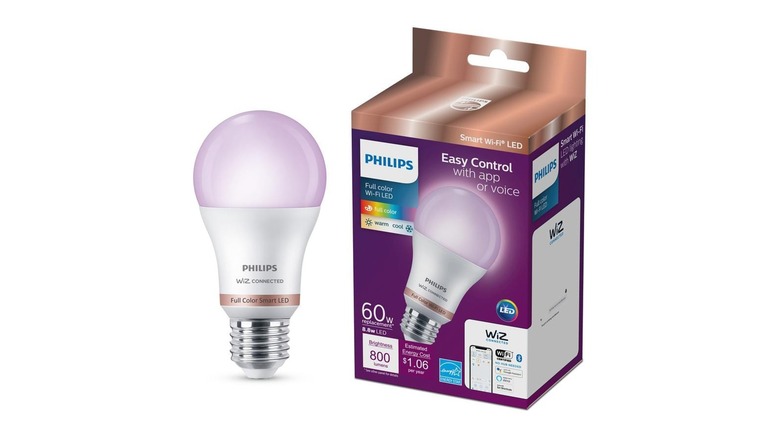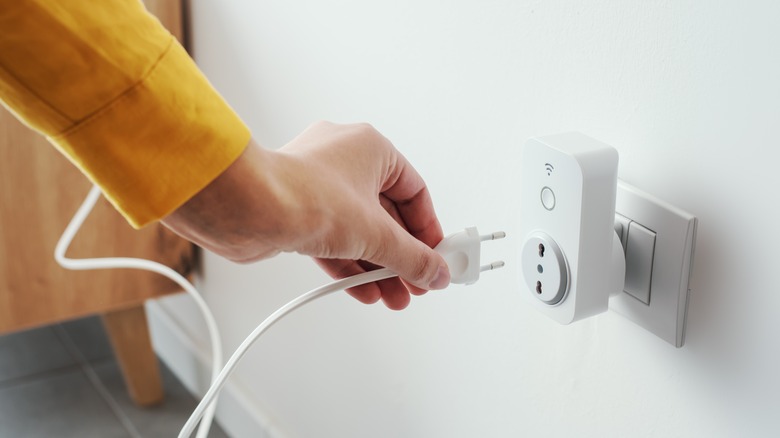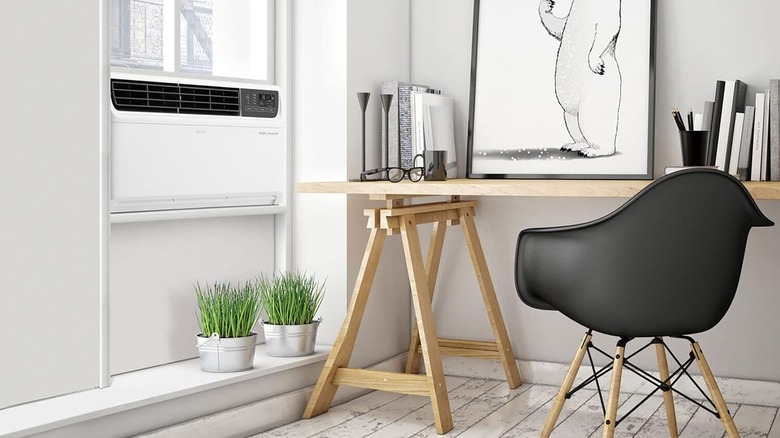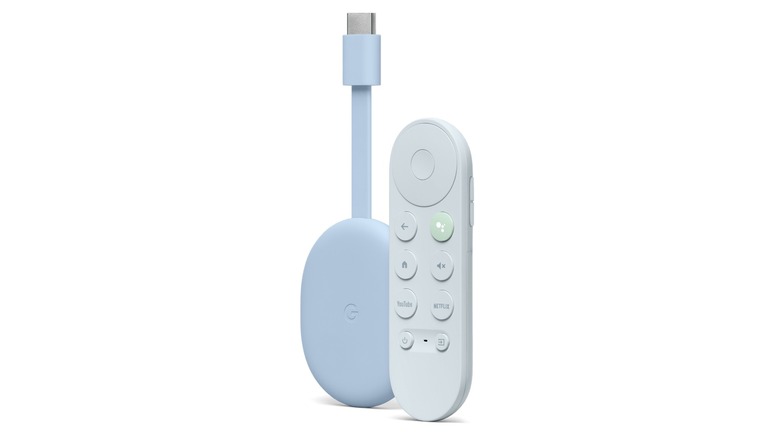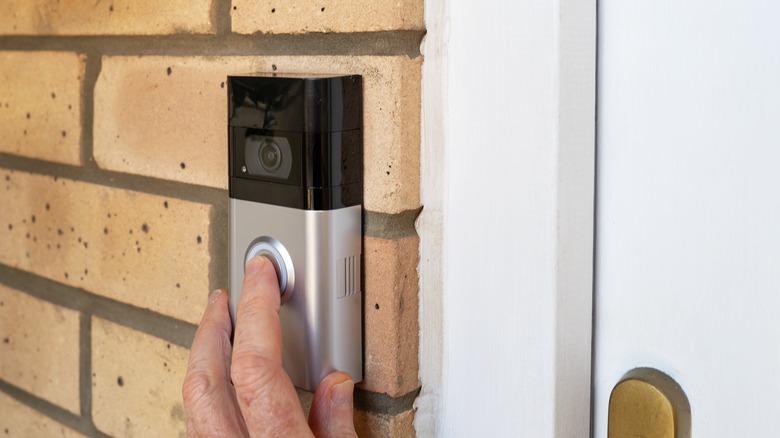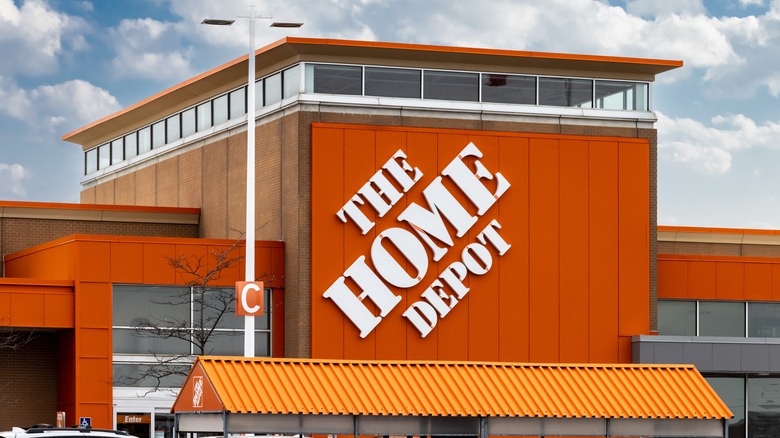5 Smart Home Devices & Accessories You Can Find At Home Depot
We may receive a commission on purchases made from links.
In recent years, the "smart home" concept has become increasingly mainstream. What was once the incredibly expensive home of the future, seemingly out of reach of anyone but wealthy homeowners, has managed to become part of the lives of people who live in homes as small as studio apartments. Wi-Fi hardware has gotten a lot smaller and a lot cheaper, and with that comes a whole ecosystem of "smart" devices, some of which don't come at that much of a premium over their "dumb" equivalents.
If you're in the market for a new air conditioner, for example, and the Wi-Fi-enabled version of your preferred model is available for a comparable price to the old-school one or even at a small premium like $50 or less, then it makes a lot of sense to get the "smart" one. For a small up-front investment, you gain the ability to save energy and annoyance on brutal summer days by turning the air conditioner on a few minutes before you get home instead of arriving at your hot, humid swamp of an abode or wasting energy by leaving it on while you're out.
The Home Depot is not necessarily an obvious destination for tech products, but as a leading home improvement chain, it's only natural that it carries a wide array of smart home devices in a dedicated smart home section. We don't have the time to look at all of them, but we have enough to examine five well-reviewed products and categories that you can find in the home improvement chain. A more in-depth explanation of why these products were chosen will be provided at the end of the article.
Smart light bulbs
Smart light bulbs, which you can control remotely, are one of the cheapest, most popular, and easiest-to-use parts of the smart home ecosystem. Most let you dim the bulbs or groups of bulbs in the manufacturer's app or a connected smart home app, with no physical dimmer switch required. Many also have full-color LEDs, so you can customize your mood lighting any way you want.
When shopping for smart light bulbs, one factor to consider is if your preferred bulb requires purchasing a separate "hub"/"bridge" to use the smart features. This is best illustrated by Phillips' two lines of smart bulbs: Hue, the more prominent line, and WiZ, the lower-priced line. Hue bulbs originally needed a $50 bridge, but Philips phased out that requirement in 2019. However, without a bridge, you can't connect to the bulbs over Wi-Fi, just Bluetooth, and you also can't use accessories like motion sensors without a bridge. WiZ bulbs, though, connect to your Wi-Fi network without a bridge.
Philips is arguably the biggest name brand when it comes to smart bulbs, and with that brand equity comes a reputation for quality. The Wirecutter, for example, lists the WiZ as the best smart bulb for use with Google Assistant; depending on the color, you can get the 60-watt equivalent SKUs for $10 to $12 each at Home Depot. You can also pick up the more expensive Philips Hue, or, if you'd rather pay less, you can check out Home Depot's private-label EcoSmart brand for about the same price as the WiZ bulbs.
Smart plugs
Another entry-level product you can buy to turn your home into a smart home is smart plugs. If you've never heard of smart plugs, they're exactly what they sound like: wall outlet pass-throughs that can control "dumb" devices with pretty simple on/off switch states, like fans and lamps.
If your room lighting is a mix of lamps and ceiling lights, then using a smart plug for each lamp — especially lamps without replaceable bulbs or lamps that can't be used with smart bulbs, like three-way lamps — allows you to mix them in with your other smart lighting in apps like Google Home. Once everything is synced up, you can use Google Home or Google Assistant to, among other things, turn all lights off or on together and set up automation routines.
Home Depot has plenty of smart plug options available online, although just a handful of them are available in-store. The online-only options include the Wyze Smart Plug, which we gave a nine out of 10 rating in 2019. In particular, SlashGear's reviewer liked its support for Google Assistant and Amazon Alexa as well as "power-hungry" 15A devices, plus its relatively low cost.
It's best to compare everything available and consider how they fit into your home. Take note of how your outlets are spaced and what's plugged into them: For tighter fits, such as an outlet next to a bulky plug (e.g., air conditioners), you should get a mini plug or a smart surge protector.
Smart air conditioners
One appliance that's a staple of the average smart home is the air conditioner. If you have central air, there are obvious benefits that you can get out of smart thermostats, but even if you don't, there are plenty of Wi-Fi-enabled air conditioners controllable by mobile apps. Those Wi-Fi features tend to come with a pretty minimal premium over "dumb" air conditioners pricing-wise, with, depending on the sale, the "smart" models sometimes selling for even less than the old-fashioned ones. (The bigger price increase, these days, comes from selecting air conditioners with dual inverters, which use less electricity.)
Finding good smart air conditioners at Home Depot is fairly easy since most of the top picks at The Wirecutter, The New York Times' deeply researched product review and recommendation website, are stocked by the chain. (And some of its listings even tout those Wirecutter recommendations.) Though the site's top pick, from Midea, appears to be mostly out of stock at this point, the same can't be said for their "also great" picks from Frigidaire, Windmill, and GE. Though the recommended Frigidaire and Windmill models are the traditional window air conditioner format, the Midea and GE are different shades of the newer U-shaped models that reduce noise and allow window access.
All manufacturers have apps, but not all have the same level of integration with smart home hubs like Google Home. If you want to control the AC from Google Home with more commands available than just power on and off, you need to do some research.
Google products with Google Assistant built-in
In addition to some of the kinds of smart devices that are there to be controlled by the likes of Google Home and — by extension, Google Assistant — Home Depot also carries Google's main non-phone, non-tablet devices for consuming digital content. Those would be the Google Chromecast with Google TV streaming player (HD and 4K), the Nest smart speakers (Mini and Audio), and the Nest Hub smart displays (7-inch and 10-inch Max model). Most of these are even available in brick-and-mortar Home Depot superstores.
They're quality components of a smart home, and in the case of the Chromecast, one of the best bargains in tech. They're great for consuming TV shows, movies, music, podcasts, audiobooks, and more, but they also have a separate role they can occupy in a smart home where the devices are linked via Google Home. They're not just linkable to Google Assistant like most smart devices are; they have Google Assistant built-in, meaning that you can use them to control your smart home devices instead of just using your phone or tablet.
Maybe you're charging your phone (or tablet) somewhere that isn't within reach while watching TV, or you have it sanitizing in a Phone Soap box, but you need to adjust the lights or air conditioner that you have connected to Google Home. You can just use Google Assistant with the relevant voice commands by talking to the Chromecast remote or the Nest speakers/screens. In 2024, most of us are tethered to our smartphones, but it's great to know that you can still control your smart devices even when you're not.
Smart doorbells and security cameras
One more class of smart home products at Home Depot is the smart security camera genre, which also includes smart doorbells. In that category, Amazon's Ring line is the name brand, and that status is earned. The company's key products have garnered very positive reviews from us here at SlashGear in the past.
Perhaps most notably, there's the Ring Battery Doorbell Pro, which sells at Home Depot for its $229.99 retail price. In our March 2024 review of the Battery Pro, Justin Owen was pretty glowing, giving it an eight out of 10 rating and a SlashGear Select seal of approval. He also noted a positive attribute that Ring's products have in general that doesn't necessarily apply to the competition: As a successful Amazon subsidiary, it's probably not going anywhere anytime soon, so you don't need to worry about buying an expensive product and eventually losing the subscription service that adds a lot of its functionality.
Justin's January 2023 SlashGear review of the Ring Spotlight Cam Pro gave it an identical rating and SlashGear Select recommendation. Retailing for $229.99 at Home Depot but sometimes on sale for less, its image quality and ease of use were praised, just like the Battery Pro, albeit with the review noting that it was on the expensive side and might not be the best choice unless someone needed all of Ring's key features.
Methodology
The most important piece of criteria for inclusion in this article was that a product/product category was sold by The Home Depot. That will inherently limit what we can recommend here. Still, it covers enough smart home products from notable brands to be a pretty solid recommendation list that could theoretically be extrapolated to other retailers. It still limited the selection a bit: Products that we might recommend without the same restrictions, like smart lightbulbs from well-regarded budget brands like Sengled or smart plugs in a wider array of sizes, but it didn't impact the other three categories nearly as much.
For specific products, we mainly prioritized positive professional reviews, with our archive here at SlashGear prioritized over those from third-party sites. When our reviews weren't available, The Wirecutter was generally the go-to because its methods and track record make it an excellent starting point. I also applied my experiences with Google Home/Google Assistant, smart lighting, smart plugs, etc. whenever possible. With that said, doing your own research before making a purchasing decision is still recommended.

